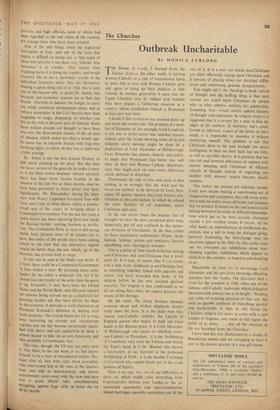The Churches
Outbreak UnCharitable
By MONICA FURLONG THE House of Lords, I learned from the Sunday Express the other week, is turning Roman Catholic at a rate of matrimonial knots as peers fall in love with Roman Catholic girls and agree to bring up their children in that Church. In another generation it seem that the Upper Chamber may be riddled with families who have poped; a Gilbertian situation in a country whose established Church is Protestant at least nor'-nor'-west.
I doubt if this revelation has aroused panic up and down the countryside. The prospect of a num- ber of likenesses of, for example, Lord Longford, is not one to strike terror into national breasts. Indeed, after his recent showing some of us feel infinitely more damage might be done by a duplication of Lord Alexander of Hillsborough.
Lord Alexander has chosen, clumsily and rudely, to imply that Protestants had better stay well clear of their new Roman Catholic playmates, since they might pick up some nasty infections, social, political Or doctrinal.
Fortunately the tide of love and unity is now coming in so strongly that the wind and the waves are unlikely to be deterred by Lord Alex- ander. Of greater interest was Lord Arran's con- tribution to the same debate, in which he echoed the most familiar of all arguments about Christians and unity.
In the red corner (runs the popular line of thought) we have the poor, perplexed plain man, desperately put off and confused by the numer- ous divisions of Christianity. In the blue corner we have reactionary ecclesiastics—Popes. Arch- bishops, bishops, priests and ministers, forever squabbling over theological minutia:.
This is a point of view much in favour among semi-Christians and non-Christians, but it won't quite do. It is true, of course, that if you condi- tion a man from childhood to see Christian love as something indelibly linked with quarrels, and sneers, you 'have wounded him badly in his religion before he has ever reached spiritual maturity. The tragedy is that conditioned as we all are along these lines, we cannot perceive the extent of the damage.
All the same, the sharp division between innocent sheep and ,wicked shepherds doesn't really meet the facts. It is the plain man who repeats anti-Catholic remarks. the Church of England parson who begins to hold out timid hands to the Roman priest. It is Lord Alexander of Hillsborough who insists on labelling every- one Catholic or Protestant: it is the Archbishop of Canterbury who visits the Vatican and shakes the Pope's hand. It is Dr. Heenan who throws a lunch-party to say farewell to the promoted Archbishop of York : it is the humble Christians of Liverpool who cannot break out of the crude patterns of bigotry. There is an easy way out of our difficulties, a short cut which would solve everything from Convocation's worries over Lanka* to the in- numerable quandaries over inter-communion. mixed marriages, apostolic succession and all the lest of it. It is a way out which non-Christians are often officiously urging upon Christians and it consists of playing down our doctrinal differ- ences and minimising genuine disagreements.
You might call it the 'theology is bunk' school of thought and the baffling thing is that such courses arc urged upon Christians by people who in other spheres—politics, art, scholarship, friendship, love--would stoutly uphold honesty of thought and expression. In religion alone it is suggested that it is proper for a man to blur the edges of his intellect. If, however, one's creed, formal or informal, is part of the fabric of one's mind, it is impossible to abandon it without destroying oneself. The problem is not that Christians have in the past brought too much intelligence to bear on their faith but too little, as well as too little charity. It is emotion that has run riot and invested differences of opinion with sinister meaning until Christians of different schools of thought instead of regarding one another with amused respect become deadly enemies.
This makes our present job infinitely harder. Unity now means making a superhuman act of imagination and acceptance that will strain every nerve and use every ounce of brains and patience that we possess. It means on the one hand a social mixing between Christians of different denomina- tions which has so far been scarcely attempted outside a few rarefied circles. It means, on the other hand, an intensification of intellectual dis- cussion, and a will to keep the dialogue going, however frustrating the interchange may on occasions appear to be. Only by this' costly route can we overcome our inhibitions about wor- shipping together, inhibitions which appear so childish to the outsider, so hopeless and disabling to us.
Meanwhile we must try to discourage Lord Alexander and his sort from throwing ridiculous spanners into the works. The Spectator had a word for the situation in 1868, when one of the hideous anti-Catholic outbreaks which disfigured the nineteenth centuriwas at its height : 'Nothing can come of arousing passions of that sort, but such an ignoble outbreak of everything spiteful and uncharitable in man as will brand the Christian religion for years to come with a new burden of disgrace, and renew in full vigour the belief of so many . . . that all the charities of life are banished from the Churches.'
I have had this text illuminated by a couple of Benedictine monks and am arranging to have it sent to the proper quarter in a nice gilt frame.






































 Previous page
Previous page